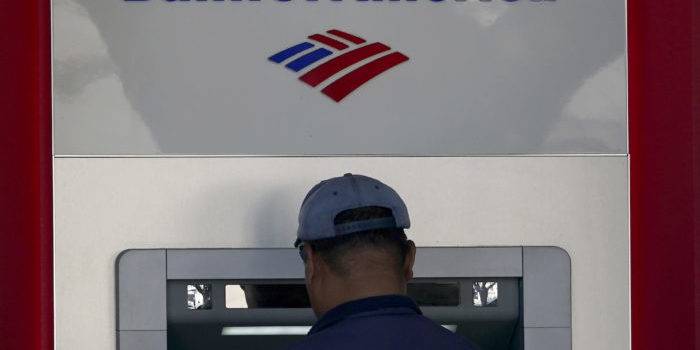(Ken Silva, Headline USA) Last year, an FBI whistleblower revealed that Bank of America provided a trove of data about January 6 protestors to the FBI—voluntarily and without a warrant.
It turns out, that was just the tip of the iceberg.
According to a Friday report from the House Weaponization Subcommittee, an estimated 50 financial institutions—and possibly more—participated in the FBI’s warrantless surveillance of J6ers. Financial institutions provided records for J6ers who committee crimes, ones who were entirely peaceful, and some who didn’t even go onto Capitol grounds on Jan. 6, 2021.
The financial institutions provided records to the FBI pursuant to the Bank Secrecy Act, which was enacted in 1970 with the aim of curtailing money laundering. The BSA requires financial institutions to file suspicious activity reports, or SARs, when they see financial transactions that may be illegal.
According to the report, the Weaponization Subcommittee interviewed former FBI counterterrorism official Peter Sullivan, who helped lead the bureau’s initiative to collect J6ers’ financial data. Sullivan told congressional investigators that he spoke to an estimated 50 financial institutions, and all were cooperative.
𝐍𝐄𝐖 𝐑𝐄𝐏𝐎𝐑𝐓: 𝐇𝐨𝐰 𝐭𝐡𝐞 𝐅𝐞𝐝𝐞𝐫𝐚𝐥 𝐆𝐨𝐯𝐞𝐫𝐧𝐦𝐞𝐧𝐭 𝐖𝐞𝐚𝐩𝐨𝐧𝐢𝐳𝐞𝐝 𝐭𝐡𝐞 𝐁𝐚𝐧𝐤 𝐒𝐞𝐜𝐫𝐞𝐜𝐲 𝐀𝐜𝐭 𝐭𝐨 𝐒𝐩𝐲 𝐨𝐧 𝐀𝐦𝐞𝐫𝐢𝐜𝐚𝐧𝐬
Think your finances are private? Think again.https://t.co/lXWqUB5iPZ pic.twitter.com/MdG3fZTR7j
— House Judiciary GOP 🇺🇸🇺🇸🇺🇸 (@JudiciaryGOP) December 6, 2024
“Despite stating that the [suspicious activity report] filing process was voluntary, Sullivan could not recall a single financial institution that declined to produce a SAR,” the Weaponization report said.
In a couple rare cases, banks pushed back against the FBI’s sweeping requests. FBI was not pleased, according to the report.
In one case, for example, Sullivan sent a list of J6ers to Standard Chartered PLC, which requested a subpoena in response. The report doesn’t explain how the matter was resolved.
In another instance with Standard Chartered, the FBI requested the bank to “run the following name and associated selectors in response to an Equity Check.” Standard Chartered responded, telling the FBI it found “an exact name match,” but again asking for a subpoena.
Again, it’s not clear how that issue was resolved.
Along with revealing the scope of the FBI’s financial surveillance of J6ers, the report also questioned the legality of the surveillance. As per law, banks are supposed to file SARs on their own initiative—but with J6ers, the FBI would ask the banks to research their clients and file SARs on them.
“While avoiding making outright demands for this information, documents show that the FBI avoids requests for legal process and routinely operates on the edge of what is permissible information sharing under the BSA,” the report found.
“By soliciting financial institutions for SAR filings directly, the FBI is treating financial institutions as arms of law enforcement charged with investigating whether a customer has engaged in any ‘suspicious activity’ on the FBI’s behalf.”
Along with Standard Chartered, other banks named in the report included MUFG and Banco Santander. Not all the 50-plus banks were named.
Along with detailing the financial surveillance of J6ers, today's Weaponization report also reveals that people using VPNs might risk being de-banked in the future — if the gubmint gets its way 😬 pic.twitter.com/spmpPAqJzP
— Ken Silva (@JD_Cashless) December 6, 2024
The report also touched on issues spanning wider than Jan. 6. According to the report, the Weaponization Subcommittee obtained documents showing that the U.S. government views the use of a Virtual Private Network, or VPN, as suspicious—meaning that people who use VPNs when conducting financial transactions risk being de-banked.
The Weaponization report called for Congress to enact reforms to improve U.S. financial privacy.
“Congress could restore Fourth Amendment protections to Americans’ financial records,” the report said. “In order to end warrantless surveillance, Congress could require a warrant before law enforcement can gain access to Americans’ private financial information.”
Ken Silva is a staff writer at Headline USA. Follow him at x.com/jd_cashless.

